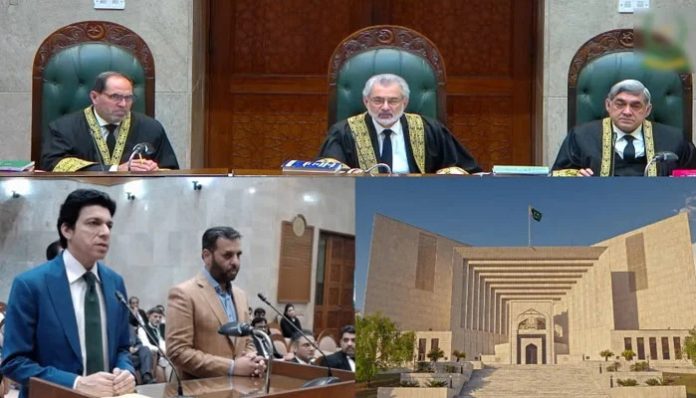DNA
ISLAMABAD: The Supreme Court on Friday accepted the apology tendered by Senator Faisal Vawda and Muttahida Qaumi Movement-Pakistan (MQM-P) lawmaker Mustafa Kamal and withdrew the contempt of court notice issued to them.
According to the court’s order, read by Chief Justice Qazi Faez Isa, both the parliamentarians — Senator Faisal Vawda and Member of the National Assembly (MNA) Mustafa Kamal — have realised that the words they used were inappropriate.
“They have now withdrawn their statement and tendered an unconditional apology to the court,” read the order.
Vawda, on Wednesday, tendered an unconditional apology to the apex court in the contempt case, saying that he has left himself on the mercy of the apex court. Kamal had, earlier this month, also sought an unconditional apology for his remarks against the judiciary.
The court further wrote about withdrawing the show-cause notice issued to both politicians in view of their reflection on the matter and tendering of apology.
During the hearing, the chief justice remarked: “In Article 66 — freedom of speech to speak in the parliament — of the Constitution, you can stand up and speak in the parliament.”
CJP Isa instructed both politicians to “be careful in the future” when mentioning the judiciary. “We respect you and hope you respect us. Demeaning each other will harm the public,” said the chief justice.
CJP told Vawda and Kamal that Article 66 protects lawmakers from speaking in the Parliament and not outside it.
The court’s decision comes more than a month after it had issued contempt of court notices to both politicians after they had done hard-hitting press conferences against the judiciary in May, with Vawda saying that no allegations could be levelled without evidence and Kamal sought to establish ethical standards for the judges as justice could “only be bought”.
Their statements had come after six Islamabad High Court (IHC) judges wrote a letter to Supreme Judicial Council (SJC) members, pointing out the intelligence agency’s meddling in judicial affairs. The politicos also pointed out the dual citizenship of an IHC judge.
Shortly after their tirade, the SC sprung into action against the leaders and took suo motu notice.
“We, however, expect that they stand by their statements submitted in courts because if there is further transgression, a simple apology may then not be acceptable to this court,” stated the order.
The court, in its order, mentioned issuing notices to 24 channels which had broadcast the press conference of Vawda and 28 channels which had live broadcast Kamal’s press conference.
It added about calling upon the channels to submit their explanation within two weeks as to why they should not be proceeded for contempt of court.
“Faisal Siddiqui states that he represents 26 channels and they have filed a ‘preliminary reply’. These documents are not signed by any representatives of the said television channels but have been submitted under the signature of Faisal Siddiqui and Usman Mirza,” read the order.
The order maintained that the court cannot consider the same as replies tendered by the said channels.
“Nonetheless, we have considered the contents of the same and the said replies, which are almost identical in nature, have referred to that they can only be proceeded against ‘if mal-intent is shown’ and that ‘settled principle of the law of contempt, that mal-intent must be established’.”
The court added: “They further proceed by stating that it is to broadcast that having, ‘broadcasted the live press conferences in the public interest as it is their right and duty under Article 19 and 19-A’.”
The order further stated: “Even if we assumed that the documents that have been filed are replies to the notices, the said television channels have justified their broadcast of the said press conferences, despite the fact that during the hearing, Faisal Siddiqui conceded that the contents of one of the press conference did prima facie constitute contempt.”
Thus, it added, the defences taken are: (a) that a television channel is not responsible for whatever it broadcasts if the same has been said by another, (b) that to constitute contempt, there must be malintent, and (c) that this is their right and duty to do so.
The court said that the explanation, in its considered opinion, is not prima facie justifiable and that it is “now constrained to issue show-cause notices who have submitted the reply”.
“Since the remaining channels have not issued any reply to the notices, we are also issuing contempt notices to them as to why they should not be proceeded against for contempt of court,” it added.
The court stated that it had, during the hearing, inquired whether the TV channels had aired any apology, but it had not.
“The same news conferences were either rebroadcast or portions from the broadcast.
Undoubtedly being commercial enterprises, the channels make money by their broadcast, therefore, along with their replies, they should also include whether the press conferences were preceded by advertisements, the number thereof and the amount earned therefrom, and the same upon conclusion of the same press conference.”

















